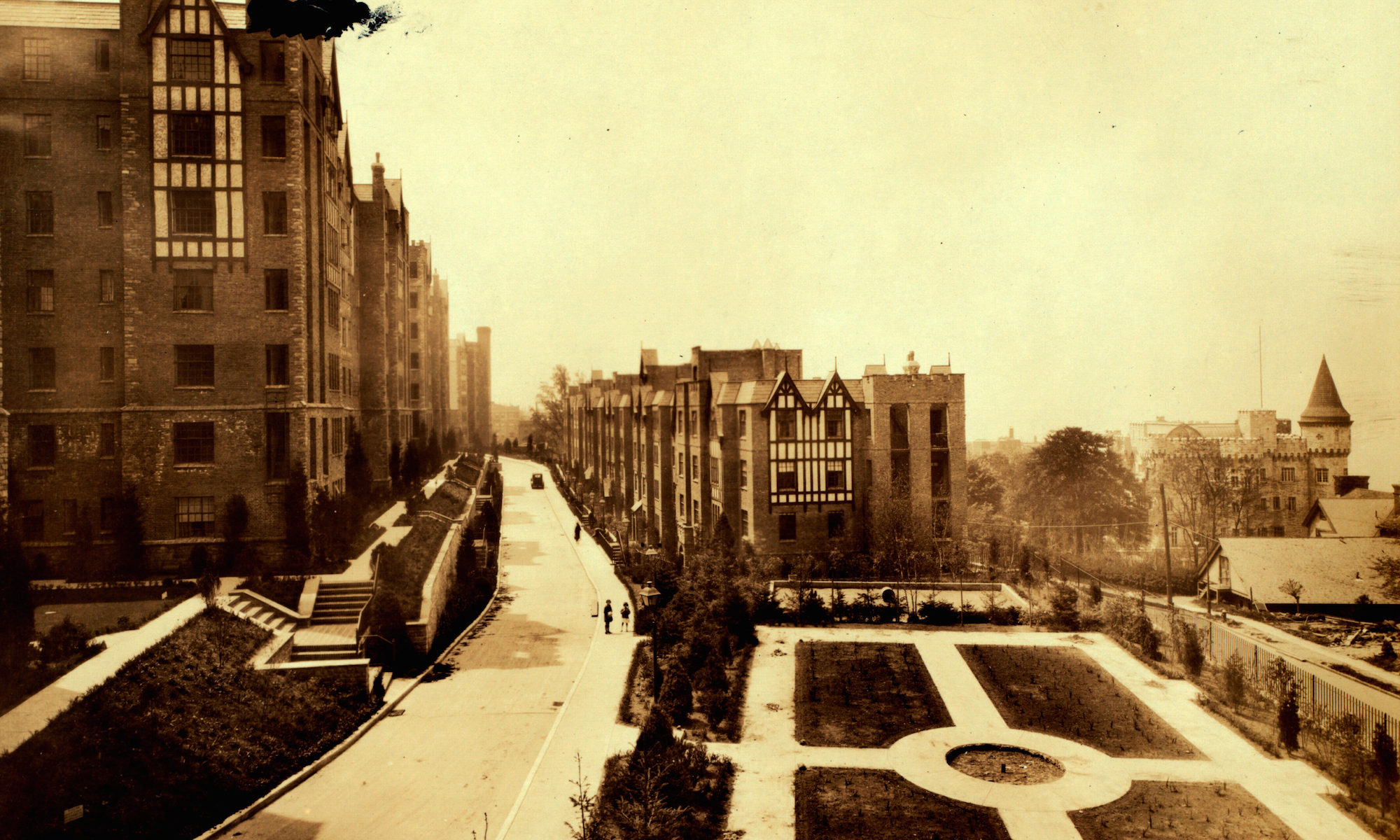Watch “The Paterno Family: Chronicling a New York Real Estate Legacy” video on YouTube
Read ‘The Paterno Brothers & Their Manhattan Apartment Houses‘ Look Book
1911 Prince Humbert 520 Cathedral Parkway
– original address was 220 West 110th Street before street was renamed and buildings renumbered. See Andrew Alpern’s note below.
Featured with floorplan in Andrew Alpern’s book New York’s Fabulous Luxury Apartments page 80.
Featured in Andrew Alpern’s book Apartments for the Affluent pages 80 & 81.
NB 104-1911
Cathedral Parkway [West 110th Street], south side, 400 w Amsterdam Avenue
12-sty brick stone and terra cotta apartment, 100×82×52.11 COST:
$150,000
OWNER:
Paterno Constructing Co, 440 Riverside Drive; Chas. V. Paterno, president, 440 Riverside Drive
ARCHITECT:
Schwartz & Gross, 347 5th [Fifth] av
ADDRESS IN REAL ESTATE RECORD:
CATHEDRAL PARKWAY, s s, 400 w Amsterdam av
Located in the Morningside Heights Historic District designated 21 February 2017
At the same time, the Paternos were constructing their only buildings on Cathedral Parkway, the Arts and Crafts style Prince Humbert and Mark Anthony at 514 and 520 Cathedral Parkway (Schwartz & Gross, 1911). In contrast to the firms’ buildings on West 116th Street, these two U-plan buildings were spare of decoration with just tapestry brick bands at the corners and attic and simple entrance with metal hood. (source)

520 Cathedral Parkway ( Prince Humbert )
Borough of Manhattan Tax Map Block 1881, Lot 7502
Date(s): 1911 (NB 104-1911)
Architect(s) / Builder(s): Schwartz & Gross
Owner(s) / Developer(s): Paterno Constructing Co.
Type: Apartment building
Style(s): Arts and Crafts
Stories: 12
Material(s): Brick; stone; terra cotta
Status: Contributing
History, Significance and Notable Characteristics
This U-shaped Arts and Crafts style apartment building, designed in 1911 by the firm of
Schwartz & Gross for the Paterno Constructing Co., was one of the many apartment buildings constructed in Morningside Heights following the opening of the IRT subway in 1904. A near twin to 514 Cathedral Parkway, the discrete decoration of the tripartite facade includes a stone base with keyed window surrounds, brick laid in Flemish bond offset by geometric-patterned brickwork piers and bands, and inset bay windows. The historic entrance with geometricpatterned surround, metal door hood and historic metal-and-glass door, as well as a stained-glass window are located in the shallow light court facing Cathedral Parkway. Built as a rental building, 520 Cathedral Parkway is now a condominium (condo lots 1201-1236).
Alterations
Cathedral Parkway Facade: Brick repointed and patched; windows replaced, one in light court infilled; intercom; lights; signage; house numbers on wood plaques; remote utility meters; grilles at basement and first story; spigots; siamese standpipe
West Facade: Brick patched and parged; windows replaced
Roof: Non-historic railing
Site
Paved light court; diamond plate hatch; pipe
Sidewalk / Curb Materials
Concrete sidewalk and curb with metal edge
References
Office of the Register, New York County, Deeds and Conveyances, Reel 1041, p.1797 (March 25, 1986).
Morningside Heights Historic District Designation Report February 21, 2017
520 Cathedral Parkway
Date: 1911
NB Number: 104-1911
Type: Apartment Building
Architect: Schwartz & Gross
Developer/Owner/Builder: Paterno Constructing Co.
NYC Landmarks Designation: Historic District
Landmark Designation Report: Morningside Heights Historic District
National Register Designation: N/A
Primary Style: Arts and Crafts
Primary Facade: Brick
Stories: 12
Historic District: Morningside Heights HD
Material(s): Brick; stone; terra cotta
Status: Contributing
History, Significance and Notable Characteristics : This U-shaped Arts and Crafts style apartment building, designed in 1911 by the firm of Schwartz & Gross for the Paterno Constructing Co., was one of the many apartment buildings constructed in Morningside Heights following the opening of the IRT subway in 1904. A near twin to 514 Cathedral Parkway, the discrete decoration of the tripartite facade includes a stone base with keyed window surrounds, brick laid in Flemish bond offset by geometric-patterned brickwork piers and bands, and inset bay windows. The historic entrance with geometricpatterned surround, metal door hood and historic metal-and-glass door, as well as a stained-glass window are located in the shallow light court facing Cathedral Parkway. Built as a rental building, 520 Cathedral Parkway is now a condominium (condo lots 1201-1236).
Site : Paved light court; diamond plate hatch; pipe
Street Sidewalk / Curb Materials: Concrete sidewalk and curb with metal edge
References: Office of the Register, New York County, Deeds and Conveyances, Reel 1041, p.1797 (March 25, 1986).
Alterations: Cathedral Parkway Facade: Brick repointed and patched; windows replaced, one in light court infilled; intercom; lights; signage; house numbers on wood plaques; remote utility meters; grilles at basement and first story; spigots; siamese standpipe
West Facade: Brick patched and parged; windows replaced
Roof: Non-historic railing (source)































Living It Up (published 1984) page 274: PRINCE HUMBERT, 520 Cathedral Parkway: A twin to The Marc Antony. Prince Humbert, heir to the Italian throne, was born in 1904 and reigned briefly as King Umberto II (from May to June 1946).


From Andrew Alpern: Notice that at the time of their construction they were 214 and 220 West 110th but are now numbered 514 and 520. That’s because the numbering had originally been from number 1 West at Fifth Avenue (so the Dakota property was 301 West 72 Street) but then the city gurus realized that looked dumb, so they made the West Side numbers start at Central Park West. Thus the original numbering for the Humbert/Anthony pair. But the houses on the north side of 110th Street logically start at 1 West at Fifth Avenue (because that’s where the buildings began). But it was really dumb to have the numbering on the south side of 110th Street so very different from the numbering on the street’s north side, so the addresses of the Humbert/Anthony pair (and all the other buildings on that side of the street) were changed.
Blog post: Step Into the Morningside Heights rowdy resort district dubbed ‘Little Coney Island’ by Esther Crain describing the area on 110th Street before the Prince Humbert and the Marc Anthony were built.



